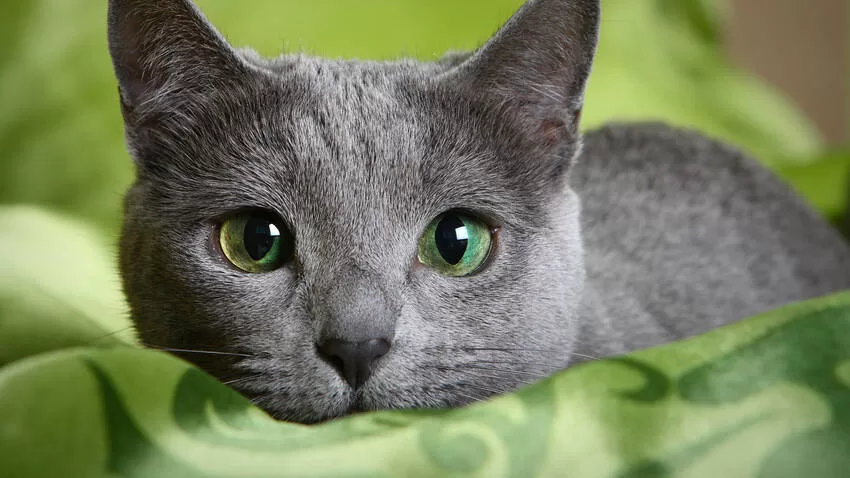You may love cats, but your immune system disagrees? In this article, we will demystify the idea of hypoallergenic cats. Yes, they exist! But no, they are not 100% allergen-free. So, before you rush to adopt a cute feline, it’s important to understand what it means to be “hypoallergenic.”
Cat allergies are common and can cause a variety of uncomfortable symptoms. A conscious choice of pet can make all the difference for people with allergies. After all, who wants to sneeze every time they pet their furry companion?
So get ready to dive into the world of hypoallergenic cats and discover how they can be the perfect solution for cat lovers with allergies!
Understanding Cat Allergies
Cat allergies are quite common and can cause a variety of uncomfortable symptoms. But do you know what causes these allergic reactions?
The answer lies in cats. Yes it is true! Cats produce a protein called Fel d 1, which is a potent allergen for many people. This protein can be found in the cat’s skin, saliva and urine. When a cat grooms itself, it spreads this protein throughout its coat. This means that every time you pet or hug your feline friend, you could be coming into contact with this allergen.

Severe Versus Mild Allergic Reactions
Allergic reactions can range from mild to severe. Some people may just sneeze or have watery eyes when they are around a cat. Other people may have more serious symptoms such as shortness of breath or skin rashes.
To avoid these uncomfortable symptoms, especially if you have a severe reaction, you may need to avoid contact with cats.
Identifying If You Are Allergic to Cats
If you suspect that you may be allergic to cats, it is important to see a doctor before making any decisions about whether or not to have a pet at home.
Tests to determine if you are allergic usually involve blood tests or skin tests. These tests measure your immune response to cat allergens.
Common Treatments for Cat Allergies
There are several options available for treating cat allergies:
- Medications: Antihistamines and corticosteroids can help control symptoms.
- Immunotherapy: This treatment involves receiving regular injections of small amounts of the allergen to help your body get used to it.
- Avoid contact: Keeping your distance from cats can be difficult for animal lovers, but sometimes it is necessary to control allergy symptoms.
Find out which cats are hypoallergenic: The definitive guide can help you with this mission!
Always remember: each case is unique and requires appropriate medical advice!
Hypoallergenic Cat Breeds
The main breeds
Cat allergy is a common condition, but did you know that there are cat breeds considered hypoallergenic? That’s right! Some cat breeds are less likely to cause allergic reactions. Let’s get to know some of them:
- Ragdoll : This breed produces less Fel d 1 protein, the main agent causing allergies in humans. Ragdolls also have long hair, but they shed less than other breeds.
- Sphynx : The Sphynx is hairless, which means they don’t spread dander (small particles of skin) around the house. However, they still produce saliva and urine, which can contain allergens.
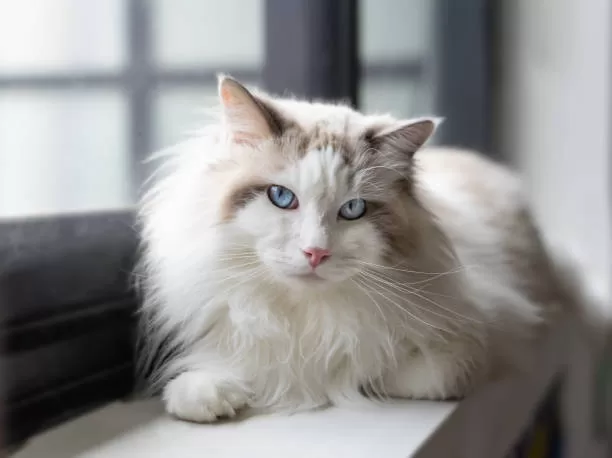
Remember: although these breeds are considered hypoallergenic, this does not necessarily mean that they will not cause allergies in everyone. The reaction may vary depending on individual sensitivity to the Fel d 1 protein.
Characteristics of Hypoallergenic Breeds
The specific characteristics of these breeds make them less likely to cause allergies. For example, the Sphynx has no hair and therefore releases less dander into the environment. Ragdolls have a smaller amount of the Fel d 1 protein in their saliva and urine.
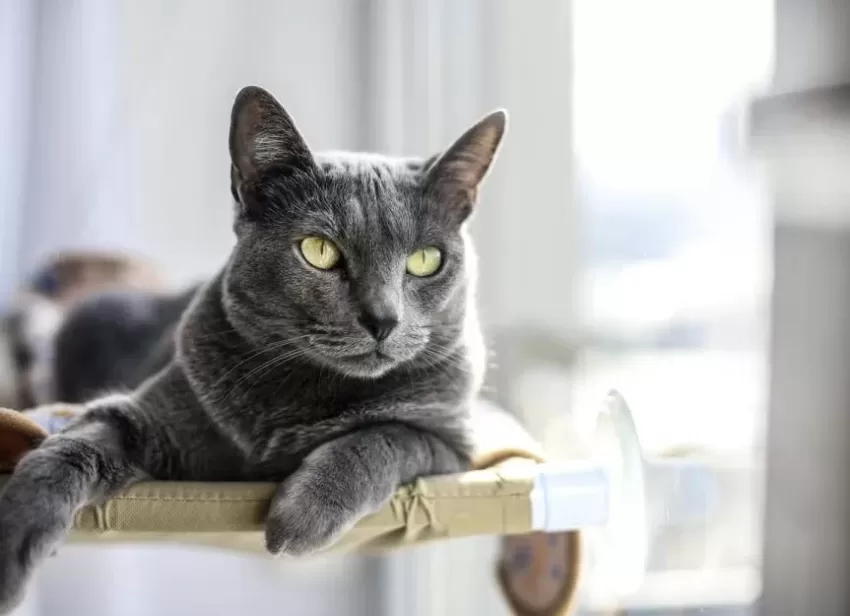
It is also important to remember that some precautions can help to further reduce the amount of allergens in the environment, such as keeping the litter box clean and bathing the animal regularly.
Efficacy in reducing allergic symptoms
No breed is 100% hypoallergenic and each person may have a different response to each type of cat. But studies have shown a significant reduction in allergic symptoms in people who live with these breeds when compared to others.
For example, a study published in the Journal of Allergy and Clinical Immunology reported that owners of Sphynx cats experienced about 50% fewer symptoms than those with regular cats.
Individual variations within the same breeds
While certain characteristics may make a cat potentially safer for people with allergies, there is individual variation within the same breeds. For example, two Ragdolls can produce different amounts of the Fel d 1 protein.
Therefore, when choosing an animal you need to take this variation into account and you may need to spend some time with the animal before adoption to see if allergic reactions occur.
Hypoallergenic Cat Care
Practical Care Tips
Caring for a hypoallergenic cat is not very different from caring for other cats, but there are some tips that can help further minimize the risk of allergic reactions. Cleaning is essential. Always keep the cat’s environment clean and free of hair. Proper nutrition can also make a difference, as a balanced diet helps maintain the animal’s health and reduce the amount of allergens.
- Regular cleaning: Clean the area where your cat spends the most time daily.
- Proper nutrition: Offer your pet a balanced diet rich in nutrients.
Regular Veterinarian Consultation
Regular veterinary consultation is essential to ensure the health of your hypoallergenic cat. The professional will be able to identify any health problem before it becomes serious and provide guidance on the best care for your pet.
Ideal Environment
The ideal environment for a hypoallergenic cat should be clean, airy and without many furniture or objects that can accumulate dust or hair. It is also important to provide comfortable places for the animal to rest and play, as well as scratching posts to prevent it from shedding too much hair around the house.
- Cleaning: Avoid accumulation of dust and hair.
- Comfort: Provide comfortable places to rest.
- Toys: Have suitable toys available to the animal.
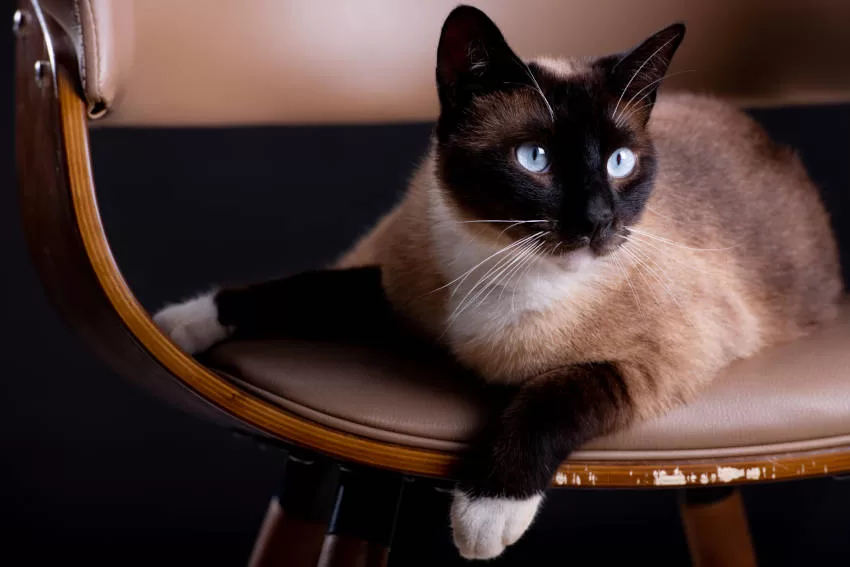
Alerts About Specific Problems
Although they are considered hypoallergenic, some cats may have specific health problems related to their breed. Therefore, be aware of the signs your pet may give indicating discomfort or illness.
For example:
- Sphynx are prone to dental problems;
- Russian Blues can suffer from obesity;
- Siamese dogs have a genetic predisposition to feline asthma;
Always remember: having a hypoallergenic cat requires special care, but nothing that cannot be controlled with attention and affection!
Popular Breeds: Russian Blue and Devon Rex
Russian Blue: A Unique Beauty
The Russian Blue is an elegant cat that stands out for its blue-gray coat. This feline has bright green eyes that contrast with the color of its fur, giving it a unique appearance. The Russian Blue’s behavior is calm and reserved, preferring peaceful environments.
This cat is popular among people with sensitivity to cat dander because it produces less Fel d 1 protein, which is responsible for most cat allergies. This doesn’t mean they are completely hypoallergenic, but they can be an option for those with mild allergies.
The average life expectancy of the Russian Blue varies between 15 to 20 years. They are healthy and robust, but they need special care for their teeth to avoid periodontal disease.
Devon Rex: The Friendly Alien
The Devon Rex is known as the “alien cat” because of its peculiar appearance. It has large oval eyes and pointed ears that give it an exotic appearance. Despite its strange appearance, this cat is very friendly and loves to be in the company of its owners.
Like the Russian Blue, the Devon Rex also produces less Fel d 1 protein, making it a popular choice among people with feline dander sensitivity.
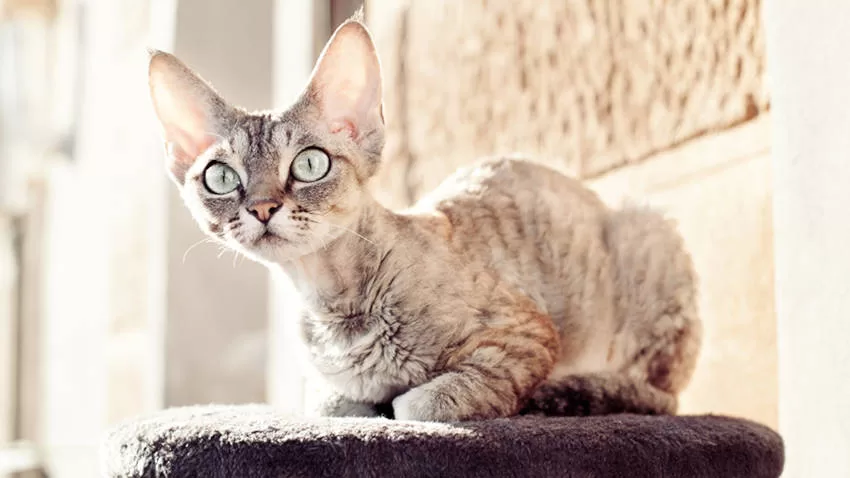
The average life expectancy of the Devon Rex is similar to that of the Russian Blue – around 15 years or more. These cats have a tendency to develop dental problems, so they need special care in that area.
Scientific studies have confirmed that breeds like the Russian Blue and Devon Rex are effective as hypoallergenic pets. However, it is worth noting that “hypoallergenic” does not mean “non-allergenic”. It is always important to get tested before adopting any animal if you have known allergies.
In short:
- The Russian Blue has a gray-blue coat and bright green eyes.
- The Devon Rex , nicknamed the “alien cat,” has large oval eyes and pointed ears.
- Both breeds produce less Fel d 1 protein.
- Average life expectancy varies between 15 and 20 years.
- They need special care for their teeth to avoid periodontal disease.
Always remember that each case is unique!
Children’s Socializing and Hypoallergenic Cats
Coexistence between children and domestic animals can bring a series of benefits to the development of little ones. In addition to stimulating empathy and respect for living beings, this interaction can also contribute to strengthening the child’s immune system, especially when it comes to hypoallergenic cats.
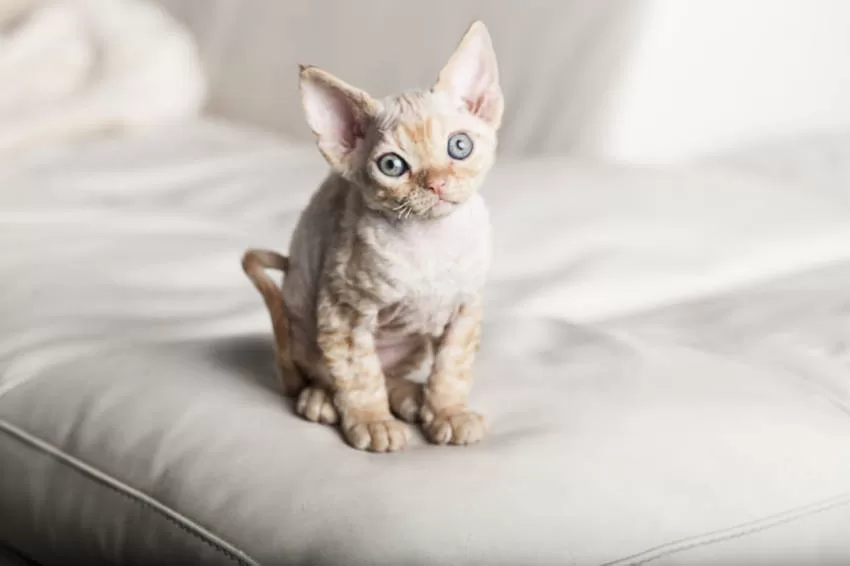
Benefits of Coexistence
- Emotional development: Children who grow up with animals tend to develop greater empathy and emotional understanding.
- Encourages responsibility: Having a pet requires daily care, teaching children about responsibility.
- Strengthening the immune system: Exposure to animals from an early age can help strengthen children’s immune systems, reducing the risk of allergies.
Despite these benefits, it is important to take some precautions when introducing a pet into a home where young children live. After all, some animals may have special characteristics that require additional care. This is the case with hypoallergenic cats. They are ideal for allergy sufferers as they produce fewer allergy-causing proteins in their humans.
Necessary Precautions
To ensure a safe and healthy coexistence between children and animals, it is necessary:
- Choose an animal suited to the child’s age and personality.
- Supervise initial interactions between the child and the animal.
- Teach the child how to treat the animal with respect and care.
There are many positive stories about this successful coexistence. For example, around the world there are reports of families who adopted hypoallergenic cats and noticed significant improvements in the health of their allergic children.
However, it is essential to remember that each person is unique and can react differently to the presence of animals – even hypoallergenic ones. Therefore, before adopting a pet of this type, consult a doctor or specialist.
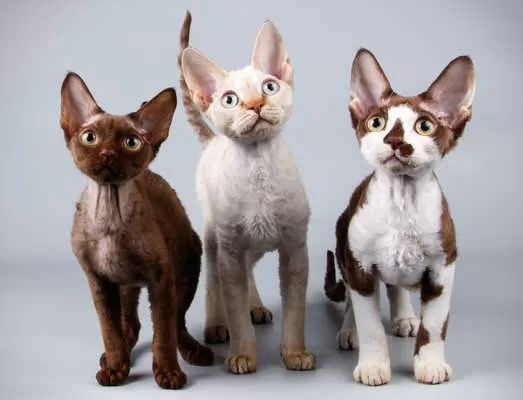
In short, coexistence between children and hypoallergenic cats can be very beneficial – for both little ones and felines! With patience, adequate guidance and a lot of love involved in this short-lived but intense process of mutual learning between these two distinct worlds – infantile human and intelligent feline –, this relationship has everything to be an enriching experience for everyone involved.
Benefits of Hypoallergenic Cats
Improvement in Quality of Life
Anyone who is allergic to the Fel d 1 protein, present in cat hair, knows how difficult it is to live with these animals. The good news is that there are hypoallergenic cats that can help improve these people’s quality of life. This is because they produce less of this protein or not at all.
Realistic Possibility for Animal Lovers
If you love animals but suffer from allergies, hypoallergenic cats are a realistic alternative. You can have a pet without having to constantly deal with allergic attacks. It is an effective way to balance the love for animals and the need for health care.
Emotional balance
The benefits of hypoallergenic cats go beyond physical health. They also contribute to the emotional balance of their owners. Having a pet can be an excellent way to combat stress and anxiety, for example.
Reducing Treatment Costs
Having a hypoallergenic cat also means significantly reducing the costs related to the ongoing treatment of allergic attacks. Fewer visits to the doctor and fewer medications to control allergic reactions result in financial savings.
In summary, the benefits of hypoallergenic cats are many and varied:
- They improve the quality of life of people sensitive to the Fel d 1 protein.
- They offer a realistic possibility for animal lovers who suffer from allergies.
- They contribute to the emotional balance of their owners.
- They reduce costs related to the continuous treatment of allergic attacks.
So, if you are thinking about having a pet and suffer from allergies, consider adopting a hypoallergenic cat. It can bring many benefits to your life!
Conclusion: Choosing Your Hypoallergenic Cat
Now that you know everything about hypoallergenic cats, it’s time to choose yours, right? Remember, each breed has its own particularities and specific care. Russian Blue or Devon Rex, for example, are great options for those looking for a furry companion but suffer from allergies. So, have you decided which one you’re going to take home?
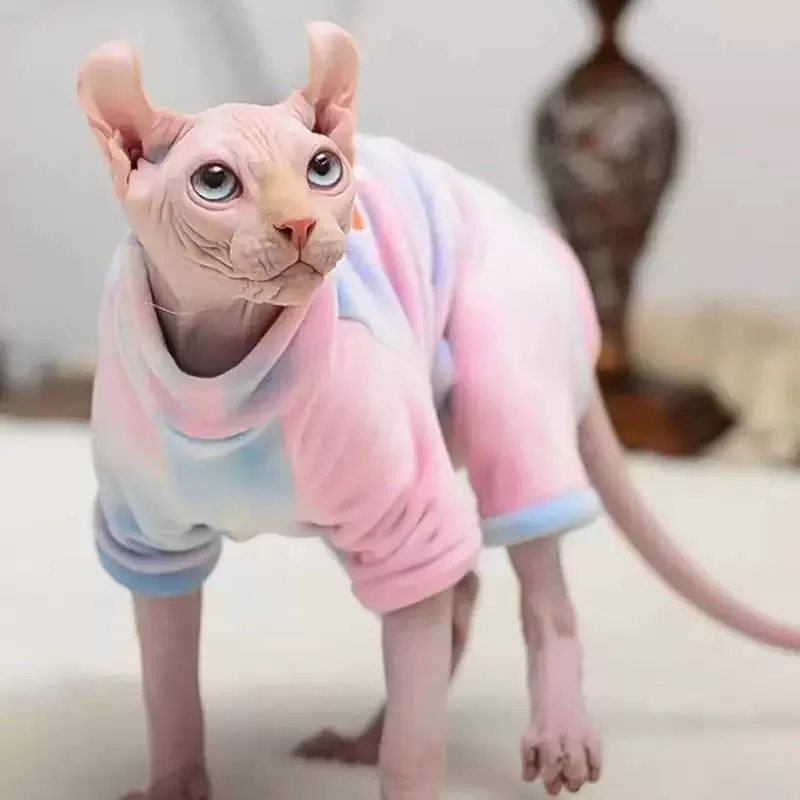
But hey: even though they are hypoallergenic, these cats can still cause some reactions in very sensitive people. Therefore, before adopting a kitten (even if it is a hypoallergenic breed), it is always good to spend time with him and see how his body reacts. This way you guarantee that coexistence will be peaceful for everyone. Go there and good luck with your choice!
FAQ
What is the best cat breed for allergy sufferers?
The best cat breeds for allergy sufferers are the Russian Blue and the Devon Rex.
Do hypoallergenic cats not cause any allergic reactions?
Even though they are hypoallergenic, these cats can still cause some reactions in very sensitive people.
How do I know if I’m allergic to a certain type of cat?
The best way to know if you are allergic to a specific type of cat is to spend time with it and observe its body’s possible reactions.
Can children live with hypoallergenic cats?
Yes! Children usually get along very well with hypoallergenic cats.
What are the benefits of hypoallergenic cats?
In addition to reducing the chances of having an allergic attack, hypoallergenic cats tend to be very affectionate and great companions.
External Links:

